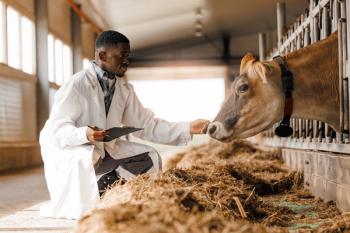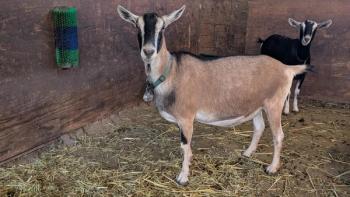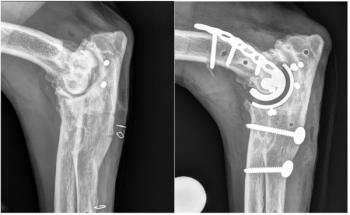
Neospora caninum Infections Uncommon in German Female Breeding Dogs
Seroprevalence of Neospora caninum is low in German female breeding dogs, a population in which N caninum seroprevalence had not been investigated previously.
Neospora caninum is an obligate intracellular parasite that causes neosporosis, a rare polysystemic disease in dogs. Dogs can serve as the definitive and intermediate host for N caninum, which targets the lumbosacral nerve roots and leads to primarily neuromuscular signs such as pelvic limb paralysis.
N caninum is spread either vertically through transplacental infection or horizontally through ingestion of meat or water sources contaminated with sporulated and infective N caninum oocysts. Interestingly, female breeding dogs with subclinical neosporosis can pass the infection to their pups during successive pregnancies.
RELATED:
- Environmental Chemicals Affect Dog Sperm Quality and Cryptorchidism Incidence
- Prevalence of Periodontal Disease in Commercial Dog Breeding Facilities
N caninum can be detected in several ways, including serology and immunohistochemistry. Previous European studies have reported varying seroprevalences of N caninum based on such factors as living environment (eg, rural, urban) and country. Until this current study, though, which was recently published in
N caninum Detection
The investigators collected serum samples from 218 healthy female breeding dogs in Germany. Enzyme-linked immunosorbent assay (ELISA) was performed to detect N caninum antibodies. Positive, and some negative, ELISA results were confirmed using immunoblot assays that detected tachyzoite antigen; tachyzoites are the rapidly dividing sexual stage of N caninum. Using the immunoblot assays helped prevent false-positive serologic results, the investigators noted.
The owners of seropositive dogs completed a questionnaire to provide data on a range of factors including age, living environment, type of dog (eg, farm, hunting, household), vaccination status, and diet.
Results and Discussion
Approximately 7% (16/218) of samples tested positive for N caninum—specific antibodies. Questionnaire responses revealed the following characteristics of the 16 seropositive dogs:
- Dogs ranged in age from 2 to 7 years.
- The majority (75%) were household dogs, with 3 living in kennels.
- Most dogs (75%) had multiple pregnancies.
- Nearly 40% were fed fresh, raw meat.
- One dog was used for hunting.
- Nearly 90% were fully vaccinated.
The low seroprevalence rate observed in the study was similar to that reported in previous studies of German dogs with clinical or subclinical neosporosis. Although many of the seropositive dogs in this study were household dogs, previous European studies have reported lower seroprevalence rates in household dogs than farm dogs.
A raw meat diet is a major risk factor for N caninum infection due to ingestion of infective oocysts from the meat of an intermediate host, such as cattle or deer. Hunting dogs, which have increased access to infective meat, are reportedly at higher risk for N caninum infection. Thus, it is not surprising that study dogs that were fed raw meat or used for hunting were seropositive for N caninum.
The large number of fully vaccinated seropositive dogs contrasts with a previous study that reported a lower seroprevalence rate of N caninum among vaccinated dogs than unvaccinated dogs.
Study Implications
Pregnant dogs represent a susceptible group of the canine population because they can spread N caninum infections to their offspring. To date, though, the clinical and economic implications of canine neosporosis on female breeding dogs and their pups has received little research attention. “Further long-term studies are necessary to better understand the impact of neosporosis on breeding dog populations,” the investigators concluded.
Dr. Pendergrass received her Doctor of Veterinary Medicine degree from the Virginia-Maryland College of Veterinary Medicine. Following veterinary school, she completed a postdoctoral fellowship at Emory University’s Yerkes National Primate Research Center. Dr. Pendergrass is the founder and owner of
Newsletter
From exam room tips to practice management insights, get trusted veterinary news delivered straight to your inbox—subscribe to dvm360.






